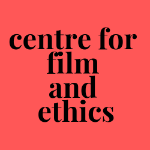Centre for Film and Ethics

Still from Salarium, Sasha Litvintseva and Daniel Mann, 2017
- To provide a focus and framework for expertise in moving image culture and ethics and its range of applications (practice, theory, aesthetics, history, memory and so forth).
- To cultivate a research environment where, in the context of ethics, there is a dialogue between film practice (documentary, film essay, artists’ moving image and fiction) and film theory.
- To attract and support research collaborations between film and the disciplines of law, medicine, drama, business, history, geography, and politics where ethics is variously treated, in order to think of ethics as a multi-faceted phenomenon.
- To open up new avenues of collaborative practice with cultural institutions such as museums, archives, cinemas, arts centres, galleries, festivals, NGOs, charities, community groups, policy bodies and internal QM research centres.
- To develop pedagogy around film and ethics appropriate to undergraduate and postgraduate students.
- To attract accomplished doctoral projects and postdoctoral researchers working in the field of film and ethics.
- To build grant capacity by supporting activities and developing seed funding through the workshopping of new ideas to lead to successful grant applications.
CENTRE FOR FILM AND ETHICS
Engaging Film in the World
The Centre for Film and Ethics facilitates interdisciplinary practice-based and theoretical work involving the intersection between film and ethics in the context of moving image research. The Centre operates as an international hub for considering both the complexities of the contemporary ethical landscape and the traditional questions of moral philosophy.
Across the work of our filmmakers and film scholars, there is a shared commitment to engaging with film’s place in the world, with the ways that the moving image helps us to understand the everyday, and where most needed, to help to make the argument for change. We recognise that the world with which we engage is one that demands diverse epistemological and conceptual approaches, one that challenges us to film sustainably and to think globally.
Our filmmakers have made award-winning films where the conversation between content and form informs their work, spanning subjects such as the ethics of care, neurodiversity, forced migration, armed conflict, extraction, land rights, environmental sensibilities, and climate emergency.
Our theoretical projects range from engagements with recent work across analytic, continental, eastern and Global South philosophical traditions, to extended and often pioneering projects in areas such as peace cinema and images of political violence, in how we image financialisation and debt, in ecocinema and film cosmologies, in decolonising film archiving and curation, and in autism and the cinema.
Follow us on @QMULFilmEthics on Twitter, and keep an eye on our events page.
This project promotes an understanding of autism as a condition with benefits, seeking to deepen knowledge of neurodiverse experience through the optic of body language, its historical crafting in medical and commercial film, and its recreation in film form. The project is led by Janet Harbord and Steven Eastwood and supported by the Wellcome Trust.
Cinema as Dao: Towards a Daoist Film Cosmology
Situating global cinema and artists’ moving images within contemporary debates of Daoist philosophy, political ecology, East Asian art history and decoloniality, this project, led by Kiki Tianqi Yu, aims to build a new theoretical framework to understand cinema and film practice through Daoist correlative and transformative cosmology.
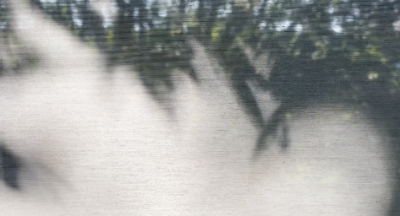 Intervening in the western centred posthumanist theorisation of cinema and culture, and critically engaging with Chinese schools of thought, it seeks to reformulate what cinema is and what cinema can do through a Daoist cosmological approach, shedding new light on how to reconceive humans’ relationship with cinema, and how to make sense of the existence of things through cinema.
Intervening in the western centred posthumanist theorisation of cinema and culture, and critically engaging with Chinese schools of thought, it seeks to reformulate what cinema is and what cinema can do through a Daoist cosmological approach, shedding new light on how to reconceive humans’ relationship with cinema, and how to make sense of the existence of things through cinema.
Cinemas of Extraction: Film, Deserts and the Making of the Planetary Frontier
With the rising popularity of cinematic depictions of worlds ravaged by heat and environmental degradation, deserts have become increasingly desirable film locations for Euro-American war and sci-fi films.
 This project, led by Daniel Mann, seeks to disentangle cinematic representations of extra-terrestrial worlds from local disputes over lands by closely examining the geopolitics behind cinema production and its effects on indigenous communities.
This project, led by Daniel Mann, seeks to disentangle cinematic representations of extra-terrestrial worlds from local disputes over lands by closely examining the geopolitics behind cinema production and its effects on indigenous communities.
Still from “Dead Lands”, Daniel Mann, 2023.
Contemporary Screen Ethics
This project, which focuses on the intertwining of the ethical with the sociopolitical across a range of screen media in different contexts internationally, resulted in a collection of essays, Contemporary Screen Ethics: Absences, Identities, Belonging, Looking Anew, ed. Lucy Bolton, David Martin-Jones, and Robert Sinnerbrink (Edinburgh University Press, 2023).
Decolonising Film Archives
Grazia Ingravalle’s current work investigates the enduring legacies of European empires and colonialism by inquiring into the history of colonial cinema and film archives from a postcolonial perspective. She has written about the ethics and politics of archiving and displaying colonial films shot in British India in the Journal of Cinema and Media Studies and Viewfinder. In the edited collection Accidental Archivism (eds. Schulte Strathaus and Hediger), she interrogates the power of ‘minor histories’ (such as that which an accidentally found Polish colonial film in Brazil bears witness to) to question the binarism of much postcolonial discourse. Her second book project will examine the history, ethics and politics of cinema as a colonial medium, its archival conservation and the curation of this ‘difficult heritage’ in the present day.
Essay Film and Narrative Techniques
While the form of essay film tends to expose the thinking and reflective process of the filmmaker, it still involves a (hidden) process of making that has been little explored. Led by Kiki Tianqi Yu and Romana Turina (Arts University Bournemonth), this project invites international artist-filmmakers and practitioner-theorists to reflect on how an essay film comes into being, what methods are involved in the making of an essay film, and how filmmakers make creative and intellectual decisions.
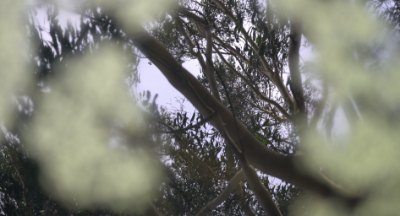 We argue that revealing various kinds of making processes can not only demystify the construction of the authorial voice in essay film form, but also contribute to understanding the methods involved in the research and development process of this form of creative practice, as knowledge production.
We argue that revealing various kinds of making processes can not only demystify the construction of the authorial voice in essay film form, but also contribute to understanding the methods involved in the research and development process of this form of creative practice, as knowledge production.
Island (2017) is a ground-breaking and award-winning feature-length documentary, the result of 12 months filming, during which time the director Steven Eastwood worked closely with persons nearing the end of life, in partnership with Mountbatten Hospice on the Isle of Wight.
 The Interval and the Instant (2017), also by Eastwood, is a multiscreen video installation directly addressing the act of dying and end-of-life care. The project was supported by the Arts Council England and The National Lottery.
The Interval and the Instant (2017), also by Eastwood, is a multiscreen video installation directly addressing the act of dying and end-of-life care. The project was supported by the Arts Council England and The National Lottery.
Global Urban Violence
Ashvin Devasundaram is one of the lead organisers of an international research network undertaking interdisciplinary approaches to interpreting global urban violence and its impact on marginalised communities. The initiative builds on British Academy seed funded interdisciplinary symposia held in Brasilia and London, bringing together researchers, practitioners, police officers, psychiatrists, curators, artists and activists from a range of social sciences, arts and humanities perspectives, to formulate deeper understandings of urban violence through the lens of migration, politics, policing, built environment, film and performing arts. Ashvin contributed a related article to Urban Violence, a British Academy special collection (2021).
Iconic Images of Political Violence
This project explores iconic photographs of political violence and their after-lives on film.
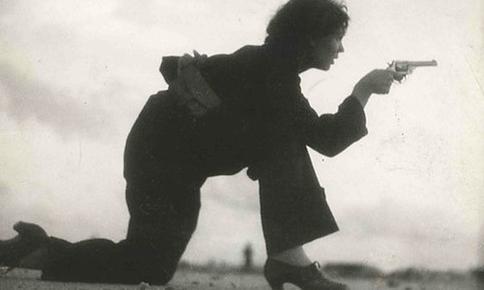 The research produced by the group, which consists of Jeremy Hicks, Libby Saxton and Guy Westwell, seeks to situate iconic images in their originating national contexts and trace their migration into wider transnational/cosmopolitan/global spaces.
The research produced by the group, which consists of Jeremy Hicks, Libby Saxton and Guy Westwell, seeks to situate iconic images in their originating national contexts and trace their migration into wider transnational/cosmopolitan/global spaces.
Directed by Yasmin Fedda, Pathogen of War previewed at Shubbak Festival 2023. In this immersive and interactive work it’s 2073 – ten years after all bacteria become resistant to antibiotics, allowing a new plague to kill half of humanity. In this investigation into the causes of the Bio-Rift, the Museum of Medical Archaeology will transport you to Iraq from the 1980s to the early 2000s. Through the true story of medical anthropologist Dr. Omar Dewachi you’ll meet ‘Acinetobacter baumannii’ and explore this bacteria’s history, from the microscopic to the geopolitical, and see how the long term effects of war profoundly impact our biosphere, driving pathogens to innovate and ultimately defeat our best medicines.
In this project Dr Guy Westwell extends his previous scholarship on the war film and anti-war film and considers the work of filmmakers who have made films for peace.  These films engage the lives of peacemakers, depict acts of conscientious objection, mutiny and desertion, explore religious and secular pacifism, and form an integral part of varied peace protest movements.
These films engage the lives of peacemakers, depict acts of conscientious objection, mutiny and desertion, explore religious and secular pacifism, and form an integral part of varied peace protest movements.
Restitution and the Moving Image
As calls for the return of looted artefacts from Western museums and ethnological collections intensify, what about similarly sequestered Global Majority film heritage? This project, led by Nikolaus Perneczky and supported by the Leverhulme Trust, considers colonial legacies of uneven development and unequal exchange in global audiovisual archiving through the lens of restitution.
Part of the research project Protracted Displacement Economies, Stories Without Borders is a series of short documentaries made by young filmmakers guided and produced by Yasmin Fedda. Films were made in Democratic Republic of Congo, Ethiopia, Lebanon, Myanmar (filmed in Thailand), and Pakistan.
Women’s Cinema of East Asia
 Existing works include: a Special Issue of Studies in Documentary Film, and a talk on maternal love at Women’s Auto/Biographical Cinema Symposium (University College Cork, Ireland).
Existing works include: a Special Issue of Studies in Documentary Film, and a talk on maternal love at Women’s Auto/Biographical Cinema Symposium (University College Cork, Ireland). Existing works include: a Special Issue of Studies in Documentary Film, and a talk on maternal love at Women’s Auto/Biographical Cinema Symposium (University College Cork, Ireland).
Existing works include: a Special Issue of Studies in Documentary Film, and a talk on maternal love at Women’s Auto/Biographical Cinema Symposium (University College Cork, Ireland).
To find out more about the Centre's work please contact the Centre’s convenor:
Dr. Libby Saxton
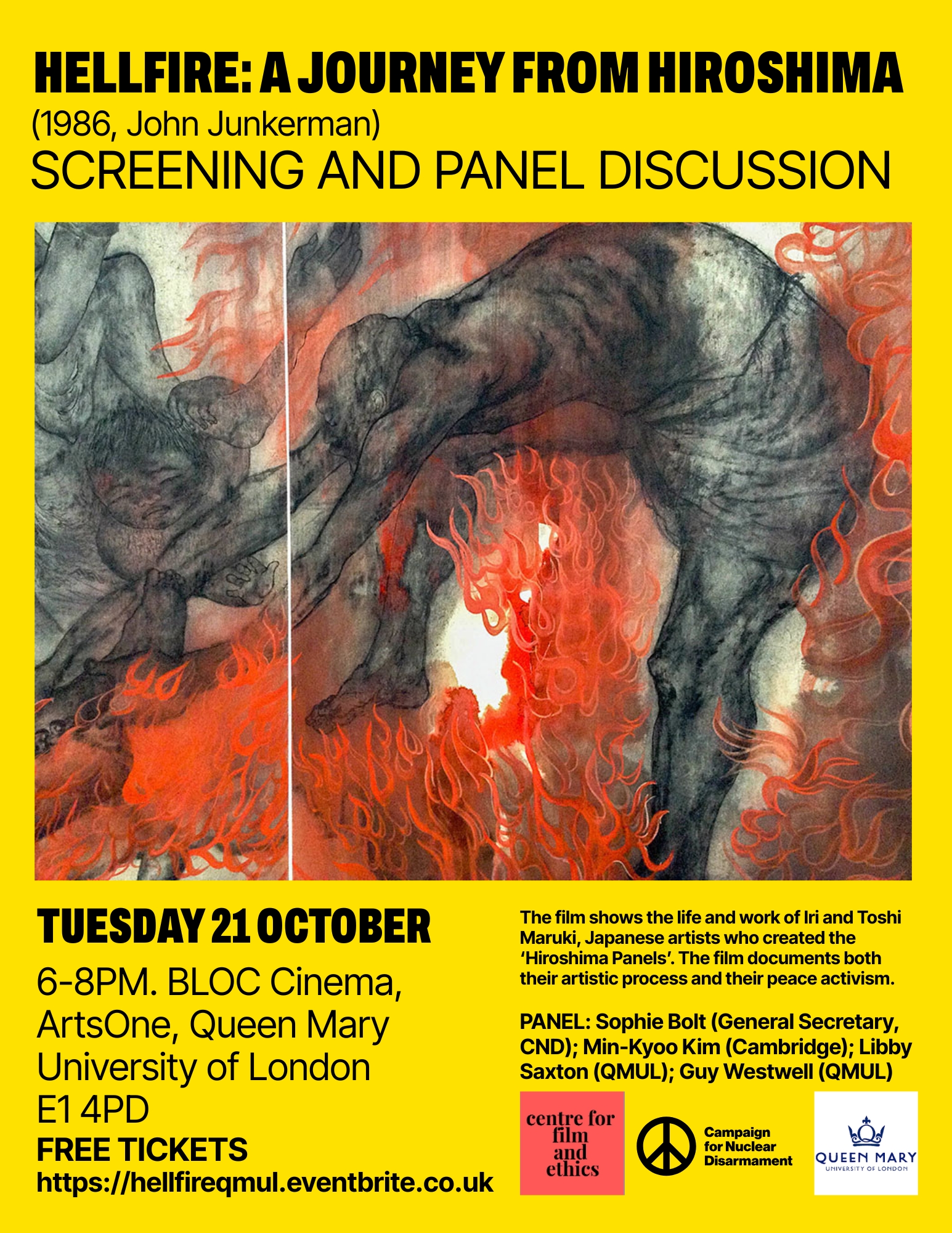
The Centre for Film and Ethics at QMUL and the Campaign for Nuclear Disarmament (CND) invite you to a special screening and panel discussion of Hellfire: A Journey from Hiroshima (1986) at the BLOC Cinema, Arts One, QMUL on Tuesday 21 October 2025 from 6 to 8pm.
Hellfire shows the life and work of Iri and Toshi Maruki, Japanese artists who created the ‘Hiroshima Panels’, a series of large-scale paintings depicting the aftermath of the atomic bombing of Japan in 1945. The film documents both their artistic process and their peace activism.
All aged 14 and older are welcome. Please register your attendance on Eventbrite: https://hellfireqmul.eventbrite.co.uk
‘Establishing Consent Within Neuronormative Constructs of Consent and Representation’
DATES TBC
All are welcome at the Centre for Film and Ethics Annual Lecture, ‘Establishing Consent Within Neuronormative Constructs of Consent and Representation’, by Project Art Works, in the BLOC Cinema, Arts One, QMUL.
Kate Adams, CEO / Artist Director of Project Art Works, will introduce the collective and discuss the processes of collaboration and film in their practice with neurodivergent artists and makers, families and carers. From the studio to public-facing productions, exhibitions and events, Project Art Works has 25 years’ experience of navigating representation within neuronormative constructs of art and culture.
Past Events
Francesca Balchin
Lyd (2024)
Focus on Palestine events – March 2025
Screening and discussion of Boycott (a ‘Focus on Palestine’ event)
Provoked Narratives: Films about Palestine
Films for Palestine – screenings and discussions
Professor Vince Brown discusses his PBS web series The Bigger Picture
KCL Strand Film Festival in partnership with CfFE: screening and discussion of Origin (Ava DuVernay, 2023)
Art on the Streets (Harriet Atkinson and Jane Dibblin): screening and discussion
'The Ethics of Intimacy Coordination’: Centre for Film and Ethics Research Seminar with Heath Pennington
The ‘Protracted Displacement Economies’ research project invites you to a preview screening of the feature film
